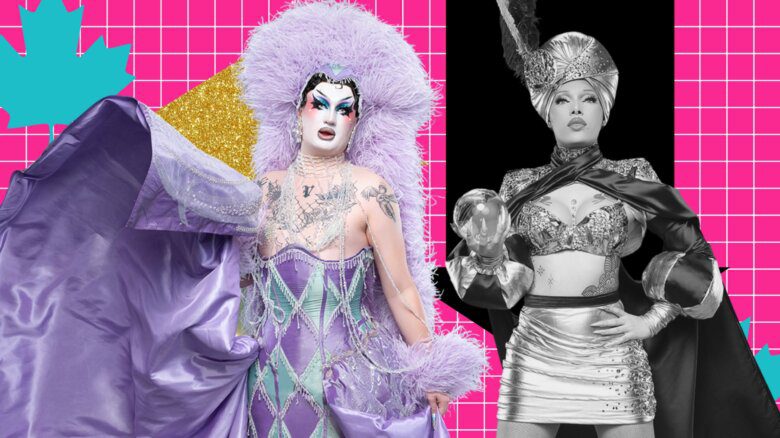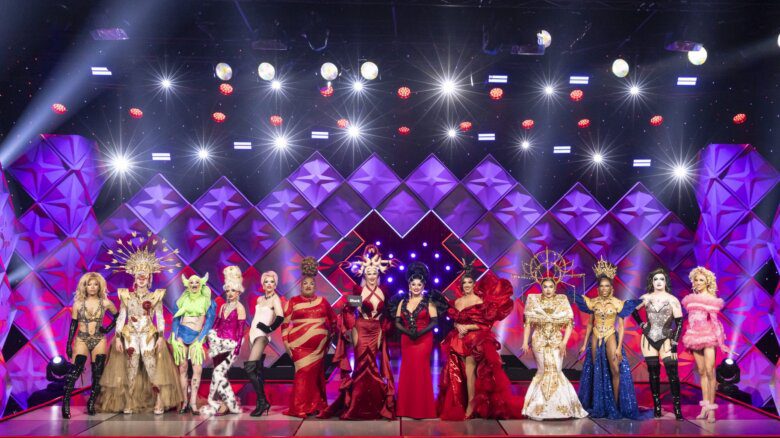“The show explores this juicy and messed up reality that in America, unlike in Canada, gay people are denied all the rights of civil marriage, including the right to sponsor your partner from another country,” says performance artist Tim Miller about his new production Us, which played at the Vancouver East Cultural Centre, Oct 18-22.
Miller is facing a quandary that many gay couples with mixed origins have had to face since the Bush administration took control of US politics.
“Because I can’t marry Alistair, my Aussie-Scottish partner of 11 years, we will likely be forced to leave the US when Alistair’s visa runs out and immigrate to Canada or the UK,” Miller explains.
“This is a job for performance art,” he continues. “As the international explosion of the ‘civil marriage for gay people’ issue has become the major culture-war issue of our time, this has brought the crappy deal we LGBT bi-national couples face in America way onto the front burner.
“Both straight and gay Americans, though, still don’t really want to look at how shoddily we are treated in the US,” he adds.
The show is a unique blend of performance art, intimate storytelling and, of all things, showtunes.
“For me, Broadway shows were a crucial finishing school for my nascent gay identity,” Miller explains. “They offered me a rich tonic of diva agency and general fabulousness.
“On a social level, musicals provided my earliest political education: they provided my crucial lessons delineating social relations. I looked to musical theatre for deeper, or at least more tuneful, guidance about how the world was organized and how systems of injustice were going to rain on my parade.
“Forget Marx and Engels. I had Rodgers and Hammerstein!”
The show opens with Miller explaining that he needs to pack so he can leave the US to be with his foreign-born partner, Alistair. Over the next hour and twenty minutes, Miller shines. As a virgin to performance art, I honestly didn’t know what to expect, but Miller was captivating.
Throughout the play, he reveals personal details of his childhood, such as his desire to strip for older men at a very young age. “When I was eight, I would pretend I was Gypsy Rose Lee and do stripteases for the neighbour boys with Gypsy on the record player,” Miller recalls.
“During sleepovers, my friends would shine their flashlights on me as they improvised their stripper mouth-trumpet music ‘wah, wah, waaaah!’ Off went my mismatched pajamas, the flannel NASA astronaut tops and the cotton cowboy-themed bottoms. As I stripped, I probably looked like a freaky Hummel figurine taking it off, taking it all off.”
Miller’s idolization of Gypsy Rose Lee was just the tip of the iceberg. He boasts that his showtune album collection was in the hundreds, but some were more influential than others.
“In my take on these shows, Fiddler on the Roof is all about gay marriage,” Miller says. “Well, at least the consistent expansion of the definition of marriage.
“Fiddler made me want a Jewish commie boyfriend like Perchik. Fiddler taught me to disobey my parents and marry for love even if it challenges tradition’s taboos. Fiddler prepared me for exile whether from Cossacks, storm troopers or George W.
“These musicals also provided my earliest political education: Little Oliver in the musical is clearly a proto-gay activist daring to ask for more!
“I looked to musical theatre for deeper, or at least more tuneful, pointers about how the world was organized and how systems of injustice were going to try to rain on my queer parade.”
Miller is a veteran of the stage, having staged 10 other productions dating back to 1984. He has received almost universal praise for Us from publications such as The Village Voice, The New York Times and The Miami Herald.
Like most of us when we have an urgent, passionate message to relate, Miller hopes his audiences not only take time to think about his show, but have a fantastic time in the process.
“I hope people get the jokes, get pissed off, get laid,” he says. “Much as I don’t worry whether it’s butter or margarine (except where anal sex is involved), I’ve never spent much time fussing about the ‘is it performance art or is it theatre’ discussion.
“The question I would much rather ask about any kind of creative work is whether it politically kicks butt or licks ass. Whether it digs deep or skates the surface. Whether it emboldens and wakes up audiences or just tries to drug them with Bush-speak mendacity.
“My new show hopefully takes on this challenge with humour, theatricality and performance art grit and gristle.”
Miller accomplishes this and more. His performance fills the audience with a sense of hope, that maybe, just maybe, enough pissed-off people south of the 49th might change things so that same-sex couples won’t have to pack their suitcases and find a new land to call home.
Miller ends Us by explaining that his love of showtunes as a child gave him a voice. A loud, persistent voice that wouldn’t shut up and always asks the tough questions that no one else wants asked.
Thanks to Us, Miller has become a fabulous voice for the gay immigration debate and he is being heard loud and clear.

 Why you can trust Xtra
Why you can trust Xtra


